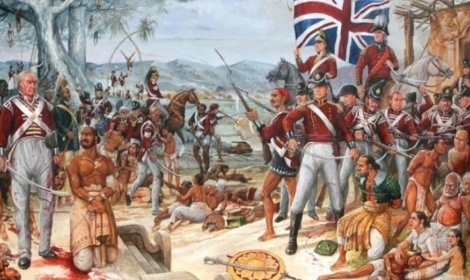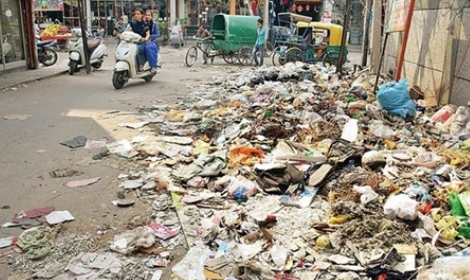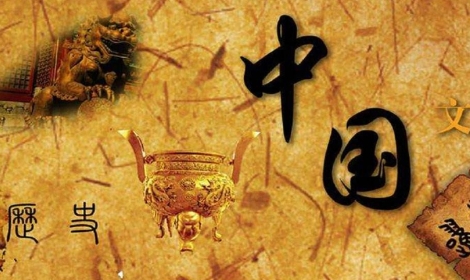历史上,英国对待美国和对待印度的殖民政策相似吗?(二)
正文翻译
Do British history books treat US and Indian colonialism similarly?
历史上,英国对待美国和对待印度的殖民政策相似吗?
历史上,英国对待美国和对待印度的殖民政策相似吗?
评论翻译
Gaurav Swaroop
Were the British benevolent with India?
Scorched earth By 1943, hordes of starving people were flooding into Calcutta and a huge number of them died on the city streets.
The Bengal Famine of 1943-44 must rank as the greatest disaster in the subcontinent in the 20th century. Nearly 4 million Indians died because of an artificial famine created by the British government, and yet it gets little more than a passing mention in Indian history books.
What is remarkable about the scale of the disaster is its time span. World War II was at its peak and the Germans were rampaging across Europe, targeting Jews, Slavs and the Roma for extermination. It took Adolf Hitler and his Nazi cohorts 12 years to round up and murder 6 million Jews, but their Teutonic cousins, the British, managed to kill almost 4 million Indians in just over a year, with Prime Minister Winston Churchill cheering from the sidelines.
Australian biochemist Dr Gideon Polya has called the Bengal Famine a “manmade holocaust” because Churchill’s policies were directly responsible for the disaster. Bengal had a bountiful harvest in 1942, but the British started diverting vast quantities of food grain from India to Britain, contributing to a massive food shortage in the areas comprising present-day West Bengal, Odisha, Bihar and Bangladesh.
英国人对印度仁慈吗?
焦土政策:1943年,大批饥饿的人涌入加尔各答,他们中的许多人死在了城市的街道上。
1943年至1944年的孟加拉饥荒是20世纪印度次大陆最大的灾难。近400万印度人死于英国政府制造的人为饥荒,但在印度的历史书中却鲜有提及。
这场灾难的规模之大值得注意的是它的时间跨度。第二次世界大战正处于高峰期,德国人在欧洲各地横冲直撞,将犹太人、斯拉夫人和罗姆人作为灭绝目标。阿道夫·希特勒和他的纳粹同伙花了12年时间围捕并杀害了600万犹太人,但他们的日耳曼兄弟英国人却在一年多的时间里杀死了近400万印度人,当时的英国首相温斯顿·丘吉尔(Winston Churchill)在一旁欢呼。
澳大利亚生物化学家Gideon Polya博士称孟加拉饥荒是“人为的大屠杀”,因为丘吉尔的政策对这场灾难负有直接责任。1942年,孟加拉收获颇丰,但英国人开始将大量粮食从印度转移到英国,导致包括今天的西孟加拉邦、奥里萨邦、比哈尔邦和孟加拉国在内的地区出现严重的粮食短缺。
Author Madhusree Mukerjee tracked down some of the survivors and paints a chilling picture of the effects of hunger and deprivation. In Churchill’s Secret War, she writes: “Parents dumped their starving children into rivers and wells. Many took their lives by throwing themselves in front of trains. Starving people begged for the starchy water in which rice had been boiled. Children ate leaves and vines, yam stems and grass. People were too weak even to cremate their loved ones.”
“No one had the strength to perform rites,” a survivor tells Mukerjee. “Dogs and jackals feasted on piles of dead bodies in Bengal’s villages.” The ones who got away were men who migrated to Calcutta for jobs and women who turned to prostitution to feed their families. “Mothers had turned into murderers, village belles into whores, fathers into traffickers of daughters,” writes Mukerjee.
Mani Bhaumik, the first to get a PhD from the IITs and whose invention of excimer surgery enabled Lasik eye surgery, has the famine etched in his memory. His grandmother starved to death because she used to give him a portion of her food.
By 1943 hordes of starving people were flooding into Calcutta, most dying on the streets. The sight of well-fed white British soldiers amidst this apocalyptic landscape was “the final judgement on British rule in India”, said the Anglophile Jawaharlal Nehru.
Churchill could easily have prevented the famine. Even a few shipments of food grain would have helped, but the British prime minister adamantly turned down appeals from two successive Viceroys, his own Secretary of State for India and even the President of the US .
作家Madhusree Mukerjee追踪到了一些幸存者,并描绘了一幅关于饥饿和匮乏影响的令人不寒而栗的画面。在丘吉尔的《秘密战争》中,她写道:“父母把饥饿的孩子扔进河里和井里。许多人在火车前自杀。饥饿的人乞求煮米饭的淀粉水。孩子们吃树叶、藤蔓、山芋茎和草。人们太虚弱了,甚至无法火化他们的亲人。”
一名幸存者告诉穆克吉:“没有人有力量举行仪式。”。“在孟加拉的村庄里,狗和豺狼以成堆的尸体为食。”逃跑的是移民到加尔各答找工作的男人和为了养家糊口而卖淫的女人。作家Madhusree Mukerjee写道:“母亲变成了杀人犯,乡村美女变成了妓女,父亲贩卖女儿”。
Mani Bhaumik是第一个从印度理工学院获得博士学位的人,他发明的准分子激光屈光手术使激光眼科手术成为可能,饥荒深深印在了他的记忆中。他的祖母是饿死的,因为她把自己的一部分食物给了他。
到1943年,大批饥饿的人涌入加尔各答,大多数人死在街头。亲英派的贾瓦哈拉尔·尼赫鲁说,在这片世界末日的风景中,肚满肠肥的英国白人士兵是“对英国在印度统治的最终判决”。
丘吉尔本可以轻而易举地阻止这场饥荒。即使是运输几批粮食也会有所帮助,但英国首相坚决拒绝了连续两任总督、他自己的印度国务大臣甚至美国总统的呼吁。
Subhas Chandra Bose, who was then fighting on the side of the Axis forces, offered to send rice from Myanmar, but the British censors did not even allow his offer to be reported.
Churchill was totally remorseless in diverting food to the British troops and Greek civilians. To him, “the starvation of anyhow underfed Bengalis (was) less serious than sturdy Greeks”, a sentiment with which Secretary of State for India and Burma, Leopold Amery, concurred.
Amery was an arch-colonialist and yet he denounced Churchill’s “Hitler-like attitude”. Urgently beseeched by Amery and the then Viceroy Archibald Wavell to release food stocks for India, Churchill responded with a telegram asking why Gandhi hadn’t died yet.
Wavell informed London that the famine “was one of the greatest disasters that has befallen any people under British rule”. He said when Holland needs food, “ships will of course be available, quite a different answer to the one we get whenever we ask for ships to bring food to India”.
当时站在轴心国军队一边作战的沙布哈斯·昌德拉·鲍斯(Subhas Chandra Bose)提出从缅甸运送大米,但英国审查机构甚至不允许报道他的提议。
丘吉尔毫不留情地把食物分给英国军队和希腊平民。对他来说,“无论如何,吃不饱的孟加拉人的饥饿都没有健壮的希腊人严重”,印度和缅甸事务国务卿利奥波德·阿默里(Leopold Amery)也赞同这一观点。
利奥波德·阿默里(Leopold Amery)是一个彻头彻尾的殖民主义者,然而他谴责丘吉尔“希特勒式的态度”。在利奥波德·阿默里(Leopold Amery)和当时的总督阿奇博尔德·韦维尔(Archibald Wavell)的紧急恳求下,丘吉尔发了一封电报,询问甘地为什么还没有去世。
韦维尔告诉伦敦,饥荒“是英国统治下所有人遭受的最大灾难之一”。他说,当荷兰需要食物时,“当然会有船只,这与我们要求用船只将食物运到印度时得到的答案完全不同”。
Churchill’s excuse — currently being peddled by his family and supporters — was Britain could not spare the ships to transport emergency supplies, but Mukerjee has unearthed documents that challenge his claim. She cites official records that reveal ships carrying grain from Australia bypassed India on their way to the Mediterranean.
Churchill’s hostility toward Indians has long been documented. At a War Cabinet meeting, he blamed the Indians themselves for the famine, saying they “breed like rabbits”. His attitude toward Indians may be summed up in his words to Amery: “I hate Indians. They are a beastly people with a beastly religion.” On another occasion, he insisted they were “the beastliest people in the world next to the Germans”.
According to Mukerjee, “Churchill’s attitude toward India was quite extreme, and he hated Indians, mainly because he knew India couldn’t be held for very long.” She writes in The Huffington Post, “Churchill regarded wheat as too precious a food to expend on non-whites, let alone on recalcitrant subjects who were demanding independence from the British Empire. He preferred to stockpile the grain to feed Europeans after the war was over.”
丘吉尔的家人和支持者目前正在兜售丘吉尔的借口,即英国无法腾出船只——船只要用来运送紧急物资,但作家Madhusree Mukerjee发现了一些文件,对他的说法提出了质疑。她引用了官方记录,显示从澳大利亚运送粮食的船只在前往地中海的途中绕过了印度。
丘吉尔对印度人的敌意早已被记录在案。在一次战时内阁会议上,他将饥荒归咎于印度人,称他们“像兔子一样繁殖”。他对印度人的态度可以用他对利奥波德·阿默里(Leopold Amery)的话来概括:“我讨厌印度人,他们是一个信奉野兽宗教的野兽民族。”还有一次,他坚称他们是“仅次于德国人的世界上最野蛮的民族”。
根据作家Madhusree Mukerjee的说法,“丘吉尔对印度的态度相当极端,他讨厌印度人,主要是因为他知道印度不会被控制很长时间。”她在《赫芬顿邮报》上写道,“丘吉尔认为小麦太珍贵了,不能花在非白人身上,更不用说花在要求从大英帝国独立的顽固不化的臣民身上了。他更喜欢储存小麦来养活战后的欧洲人。”
In October 1943, at the peak of the famine, Churchill said at a lavish banquet to mark Wavell’s appointment: “When we look back over the course of years, we see one part of the world’s surface where there has been no war for three generations. Famines have passed away — until the horrors of war and the dislocations of war have given us a taste of them again — and pestilence has gone… This episode in Indian history will surely become the Golden Age as time passes, when the British gave them peace and order, and there was justice for the poor, and all men were shielded from outside dangers.”
Churchill was not only a racist but also a liar.
India-hater Winston Churchill blamed Indians for the famine
A history of holocausts
1943年10月,饥荒最严重的时候,丘吉尔在为纪念韦维尔的任命而举行的盛大宴会上说:“当我们回顾过去的岁月,我们看到地球表面的一部分已经有三代人没有战争了。饥荒已经过去了——直到战争的恐怖和战争的混乱让我们再次尝到了它们的味道——瘟疫也消失了……随着时间的推移,这段印度历史上的插曲肯定会成为黄金时代,英国人给了他们和平与秩序,穷人得到了正义,所有人都受到了保护,免受外界的危险。”
丘吉尔不仅是个种族主义者,还是个骗子。
憎恨印度的温斯顿·丘吉尔将饥荒归咎于印度人
大屠杀史
To be sure, Churchill’s policy towards famine-stricken Bengal wasn’t any different from earlier British conduct in India. In Late Victorian Holocausts, Mike Davis points out that here were 31 serious famines in 120 years of British rule compared with 17 in the 2,000 years before British rule.
In his book, Davis tells the story of the famines that killed up to 29 million Indians. These people were, he says, murdered by British State policy. In 1876, when drought destituted the farmers of the Deccan plateau, there was a net surplus of rice and wheat in India. But the Viceroy, Robert Bulwer-Lytton, insisted that nothing should prevent their export to England.
可以肯定的是,丘吉尔对遭受饥荒的孟加拉的政策与英国早期在印度的行为没有什么不同。在《维多利亚晚期大屠杀》(Late Victorian Holocaust)一书中,迈克·戴维斯指出,在英国统治的120年里,这里发生了31次严重的饥荒,而在英国统治之前的2000年,仅发生17次严重的饥荒。
戴维斯在书中讲述了造成两千九百万印度人死亡的饥荒的故事。他说,这些人是被英国国家政策谋杀的。1876年,当干旱摧毁了德干高原的农民时,印度的水稻和小麦出现了净盈余。但总督罗伯特·布尔维尔-利顿坚持认为,没有什么能阻止将它们出口到英国。
In 1877 and 1878, at the height of the famine, grain merchants exported record quantities of grain. As the peasants began to starve, government officials were ordered “to discourage relief works in every possible way”. The only relief permitted in most districts was hard labour, from which anyone in an advanced state of starvation was turned away. Within these labour camps, the workers were given less food than the Jewish inmates of Buchenwald, the Nazi concentration camp of World War II.
Even as millions died, Lytton ignored all efforts to alleviate the suffering of millions of peasants in the Madras region and concentrated on preparing for Queen Victoria’s investiture as Empress of India. The highlight of the celebrations was a week-long feast at which 68,000 dignitaries heard her promise the nation “happiness, prosperity and welfare”.
In 1901, The Lancet estimated that at least 19 million Indians had died in western India during the famine of the 1890s. The death toll was so high because the British refused to implement famine relief. Davis says life expectancy in India fell by 20 percent between 1872 and 1921.
So it’s hardly surprising that Hitler’s favourite film was The Lives of a Bengal Lancer, which showed a handful of Britons holding a continent in thrall. The Nazi leader told the then British Foreign Secretary Edward Wood (Earl of Halifax) that it was one of his favorite films because “that was how a superior race must behave and the film was compulsory viewing for the SS (Schutz-Staffel, the Nazi ‘protection squadron’)”.
1877年和1878年,在饥荒最严重的时候,粮食商人出口的粮食数量创了纪录。由于农民开始挨饿,政府官员被命令“尽一切可能阻止救济工作”。大多数地区唯一允许的救济对象是苦役,任何处于严重饥饿状态的人都被拒之门外。在这些劳改营中,工人们得到的食物比二战纳粹集中营布痕瓦尔德的犹太囚犯少。
即使有无数人死亡,利顿忽视了所有减轻马德拉斯地区无数农民痛苦的努力,集中精力为维多利亚女王加冕为印度女皇做准备。庆祝活动的亮点是为期一周的盛宴,68000名政要在宴会上听到了她对国家“幸福、繁荣和福利”的承诺。
1901年,《柳叶刀》估计,在19世纪90年代的饥荒中,印度西部至少有1900万印度人死亡。死亡人数如此之高是因为英国拒绝实施饥荒救济。戴维斯说,从1872年到1921年,印度人的预期寿命下降了20%。
因此,希特勒最喜欢的电影是《孟加拉枪骑兵的生活》也就不足为奇了,这部电影展示了少数英国人奴役着一片大陆。这位纳粹领袖告诉当时的英国外交大臣爱德华·伍德(哈利法克斯伯爵),这是他最喜欢的电影之一,因为“这就是一个优秀种族的行为方式,党卫军(Schutz-Staffel,纳粹‘保护中队’)必须观看这部电影。”
Crime and consequences
While Britain has offered apologies to other nations, such as Kenya for the Mau Mau massacre, India continues to have such GENOCIDEs swept under the carpet. Other nationalities have set a good example for us. Israel, for instance, cannot forget the Holocaust; neither will it let others, least of all the Germans. Germany continues to dole out hundreds of millions of dollars in cash and arms aid to Israel.
Armenia cannot forget the Great Crime — the systematic massacre of 1.8 million Armenians by the Turks during World War I. The Poles cannot forget Joseph Stalin’s Katyn massacre.
The Chinese want a clear apology and reparations from the Japanese for at least 40,000 killed and raped in Nanking during World War II. And then there is the bizarre case of the Ukrainians, who like to call a famine caused by Stalin’s economic policies as GENOCIDE, which it clearly was not. They even have a word for it: Holodomor.
And yet India alone refuses to ask for reparations, let alone an apology. Could it be because the British were the last in a long list of invaders, so why bother with an England suffering from post-imperial depression? Or is it because India’s English-speaking elites feel beholden to the British? Or are we simply a nation condemned to repeating our historical mistakes? Perhaps we forgive too easily.
犯罪和后果
尽管英国已就茅茅大屠杀向肯尼亚等其他国家道歉,但印度仍在掩盖此类种族灭绝事件。其他民族为我们树立了一个很好的榜样。例如,以色列不能忘记大屠杀;它也不会让其他人,尤其是德国人忘记。德国持续向以色列提供数亿美元的现金和武器援助。
亚美尼亚不能忘记第一次世界大战期间土耳其人对180万亚美尼亚人的系统性屠杀。波兰人不能忘记约瑟夫·斯大林的卡廷大屠杀。
中国人希望日本对二战期间在南京被杀害和强奸的至少4万人作出明确道歉和赔偿。还有一个奇怪的乌克兰人的例子,他们喜欢把斯大林的经济政策造成的饥荒称为种族灭绝,这显然不是。他们甚至有一个词来形容它:乌克兰大饥荒(Holodomor)。
然而,只有印度拒绝要求赔偿,更不用说道歉了。这可能是因为英国人是一长串入侵者名单上的最后一个,所以为什么要为一个遭受后帝国萧条的英格兰而烦恼呢?还是因为说英语的印度精英们觉得自己欠英国人的情?还是说我们只是一个注定要重蹈历史覆辙的国家?也许我们太容易原谅了。
But forgiveness is different from forgetting, which is what Indians are guilty of. It is an insult to the memory of millions of Indians whose lives were snuffed out in artificial famines.
British attitudes towards Indians have to seen in the backdrop of India’s contribution to the Allied war campaign. By 1943, more than 2.5 million Indian soldiers were fighting alongside the Allies in Europe, Africa and Southeast Asia. Vast quantities of arms, ammunition and raw materials sourced from across the country were shipped to Europe at no cost to Britain.
Britain’s debt to India is too great to be ignored by either nation. According to Cambridge University historians Tim Harper and Christopher Bayly, “It was Indian soldiers, civilian labourers and businessmen who made possible the victory of 1945. Their price was the rapid independence of India.”
There is not enough wealth in all of Europe to compensate India for 250 years of colonial loot. Forget the money, do the British at least have the grace to offer an apology? Or will they, like Churchill, continue to delude themselves that English rule was India’s “Golden Age”?
但宽恕不同于遗忘,而遗忘是印度人所犯的错误。这是对无数记忆中印度人的侮辱,他们的生命在人为的饥荒中被扼杀。
英国对印度人的态度必须放在印度对盟军战争的贡献的背景下看。到1943年,超过250万印度士兵在欧洲、非洲和东南亚与盟军并肩作战。大量来自全国各地的武器、弹药和原材料被运往欧洲,而英国没有付出任何代价。
英国欠印度的债务太大了,任何一个国家都不能忽视。根据剑桥大学历史学家Tim Harper和Christopher Bayly的说法,“正是印度士兵、平民劳工和商人使1945年的胜利成为可能。他们的代价是印度迅速独立。”
对于印度遭遇的250年殖民掠夺,整个欧洲没有足够的财富来进行补偿。别管钱了,英国人至少该有道歉的风度吧,或者他们会像丘吉尔一样,继续欺骗自己,认为英国统治下的印度是印度的“黄金时代”。
Sourath Chatterjee
This is a quite interesting question, ok I will thou try my best to answer your question,
Firstly, Lord was a Honour Given or bestowed on someone for his or her loyalty to the crown or work
Secondly, the people who received Honors are tend to use it in their private or official life
Thirdly, most of the History we study today was written or composed during g the British Raj, so they tend to use their full name
But I would say try to have your own conclusion with specific research.
这是一个很有趣的问题,好吧,我会尽力回答你的问题,
首先,勋爵主是由于某人对王室或工作的忠诚而授予或给予的荣誉
其次,获得荣誉的人倾向于在私人或公务生活中使用荣誉
第三,我们今天研究的大部分历史都是在英国统治时期写成的,所以他们倾向于使用他们的全名
但我想说,试着通过具体的研究得出你自己的结论。
Were the British benevolent with India?
Scorched earth By 1943, hordes of starving people were flooding into Calcutta and a huge number of them died on the city streets.
The Bengal Famine of 1943-44 must rank as the greatest disaster in the subcontinent in the 20th century. Nearly 4 million Indians died because of an artificial famine created by the British government, and yet it gets little more than a passing mention in Indian history books.
What is remarkable about the scale of the disaster is its time span. World War II was at its peak and the Germans were rampaging across Europe, targeting Jews, Slavs and the Roma for extermination. It took Adolf Hitler and his Nazi cohorts 12 years to round up and murder 6 million Jews, but their Teutonic cousins, the British, managed to kill almost 4 million Indians in just over a year, with Prime Minister Winston Churchill cheering from the sidelines.
Australian biochemist Dr Gideon Polya has called the Bengal Famine a “manmade holocaust” because Churchill’s policies were directly responsible for the disaster. Bengal had a bountiful harvest in 1942, but the British started diverting vast quantities of food grain from India to Britain, contributing to a massive food shortage in the areas comprising present-day West Bengal, Odisha, Bihar and Bangladesh.
英国人对印度仁慈吗?
焦土政策:1943年,大批饥饿的人涌入加尔各答,他们中的许多人死在了城市的街道上。
1943年至1944年的孟加拉饥荒是20世纪印度次大陆最大的灾难。近400万印度人死于英国政府制造的人为饥荒,但在印度的历史书中却鲜有提及。
这场灾难的规模之大值得注意的是它的时间跨度。第二次世界大战正处于高峰期,德国人在欧洲各地横冲直撞,将犹太人、斯拉夫人和罗姆人作为灭绝目标。阿道夫·希特勒和他的纳粹同伙花了12年时间围捕并杀害了600万犹太人,但他们的日耳曼兄弟英国人却在一年多的时间里杀死了近400万印度人,当时的英国首相温斯顿·丘吉尔(Winston Churchill)在一旁欢呼。
澳大利亚生物化学家Gideon Polya博士称孟加拉饥荒是“人为的大屠杀”,因为丘吉尔的政策对这场灾难负有直接责任。1942年,孟加拉收获颇丰,但英国人开始将大量粮食从印度转移到英国,导致包括今天的西孟加拉邦、奥里萨邦、比哈尔邦和孟加拉国在内的地区出现严重的粮食短缺。
Author Madhusree Mukerjee tracked down some of the survivors and paints a chilling picture of the effects of hunger and deprivation. In Churchill’s Secret War, she writes: “Parents dumped their starving children into rivers and wells. Many took their lives by throwing themselves in front of trains. Starving people begged for the starchy water in which rice had been boiled. Children ate leaves and vines, yam stems and grass. People were too weak even to cremate their loved ones.”
“No one had the strength to perform rites,” a survivor tells Mukerjee. “Dogs and jackals feasted on piles of dead bodies in Bengal’s villages.” The ones who got away were men who migrated to Calcutta for jobs and women who turned to prostitution to feed their families. “Mothers had turned into murderers, village belles into whores, fathers into traffickers of daughters,” writes Mukerjee.
Mani Bhaumik, the first to get a PhD from the IITs and whose invention of excimer surgery enabled Lasik eye surgery, has the famine etched in his memory. His grandmother starved to death because she used to give him a portion of her food.
By 1943 hordes of starving people were flooding into Calcutta, most dying on the streets. The sight of well-fed white British soldiers amidst this apocalyptic landscape was “the final judgement on British rule in India”, said the Anglophile Jawaharlal Nehru.
Churchill could easily have prevented the famine. Even a few shipments of food grain would have helped, but the British prime minister adamantly turned down appeals from two successive Viceroys, his own Secretary of State for India and even the President of the US .
作家Madhusree Mukerjee追踪到了一些幸存者,并描绘了一幅关于饥饿和匮乏影响的令人不寒而栗的画面。在丘吉尔的《秘密战争》中,她写道:“父母把饥饿的孩子扔进河里和井里。许多人在火车前自杀。饥饿的人乞求煮米饭的淀粉水。孩子们吃树叶、藤蔓、山芋茎和草。人们太虚弱了,甚至无法火化他们的亲人。”
一名幸存者告诉穆克吉:“没有人有力量举行仪式。”。“在孟加拉的村庄里,狗和豺狼以成堆的尸体为食。”逃跑的是移民到加尔各答找工作的男人和为了养家糊口而卖淫的女人。作家Madhusree Mukerjee写道:“母亲变成了杀人犯,乡村美女变成了妓女,父亲贩卖女儿”。
Mani Bhaumik是第一个从印度理工学院获得博士学位的人,他发明的准分子激光屈光手术使激光眼科手术成为可能,饥荒深深印在了他的记忆中。他的祖母是饿死的,因为她把自己的一部分食物给了他。
到1943年,大批饥饿的人涌入加尔各答,大多数人死在街头。亲英派的贾瓦哈拉尔·尼赫鲁说,在这片世界末日的风景中,肚满肠肥的英国白人士兵是“对英国在印度统治的最终判决”。
丘吉尔本可以轻而易举地阻止这场饥荒。即使是运输几批粮食也会有所帮助,但英国首相坚决拒绝了连续两任总督、他自己的印度国务大臣甚至美国总统的呼吁。
Subhas Chandra Bose, who was then fighting on the side of the Axis forces, offered to send rice from Myanmar, but the British censors did not even allow his offer to be reported.
Churchill was totally remorseless in diverting food to the British troops and Greek civilians. To him, “the starvation of anyhow underfed Bengalis (was) less serious than sturdy Greeks”, a sentiment with which Secretary of State for India and Burma, Leopold Amery, concurred.
Amery was an arch-colonialist and yet he denounced Churchill’s “Hitler-like attitude”. Urgently beseeched by Amery and the then Viceroy Archibald Wavell to release food stocks for India, Churchill responded with a telegram asking why Gandhi hadn’t died yet.
Wavell informed London that the famine “was one of the greatest disasters that has befallen any people under British rule”. He said when Holland needs food, “ships will of course be available, quite a different answer to the one we get whenever we ask for ships to bring food to India”.
当时站在轴心国军队一边作战的沙布哈斯·昌德拉·鲍斯(Subhas Chandra Bose)提出从缅甸运送大米,但英国审查机构甚至不允许报道他的提议。
丘吉尔毫不留情地把食物分给英国军队和希腊平民。对他来说,“无论如何,吃不饱的孟加拉人的饥饿都没有健壮的希腊人严重”,印度和缅甸事务国务卿利奥波德·阿默里(Leopold Amery)也赞同这一观点。
利奥波德·阿默里(Leopold Amery)是一个彻头彻尾的殖民主义者,然而他谴责丘吉尔“希特勒式的态度”。在利奥波德·阿默里(Leopold Amery)和当时的总督阿奇博尔德·韦维尔(Archibald Wavell)的紧急恳求下,丘吉尔发了一封电报,询问甘地为什么还没有去世。
韦维尔告诉伦敦,饥荒“是英国统治下所有人遭受的最大灾难之一”。他说,当荷兰需要食物时,“当然会有船只,这与我们要求用船只将食物运到印度时得到的答案完全不同”。
Churchill’s excuse — currently being peddled by his family and supporters — was Britain could not spare the ships to transport emergency supplies, but Mukerjee has unearthed documents that challenge his claim. She cites official records that reveal ships carrying grain from Australia bypassed India on their way to the Mediterranean.
Churchill’s hostility toward Indians has long been documented. At a War Cabinet meeting, he blamed the Indians themselves for the famine, saying they “breed like rabbits”. His attitude toward Indians may be summed up in his words to Amery: “I hate Indians. They are a beastly people with a beastly religion.” On another occasion, he insisted they were “the beastliest people in the world next to the Germans”.
According to Mukerjee, “Churchill’s attitude toward India was quite extreme, and he hated Indians, mainly because he knew India couldn’t be held for very long.” She writes in The Huffington Post, “Churchill regarded wheat as too precious a food to expend on non-whites, let alone on recalcitrant subjects who were demanding independence from the British Empire. He preferred to stockpile the grain to feed Europeans after the war was over.”
丘吉尔的家人和支持者目前正在兜售丘吉尔的借口,即英国无法腾出船只——船只要用来运送紧急物资,但作家Madhusree Mukerjee发现了一些文件,对他的说法提出了质疑。她引用了官方记录,显示从澳大利亚运送粮食的船只在前往地中海的途中绕过了印度。
丘吉尔对印度人的敌意早已被记录在案。在一次战时内阁会议上,他将饥荒归咎于印度人,称他们“像兔子一样繁殖”。他对印度人的态度可以用他对利奥波德·阿默里(Leopold Amery)的话来概括:“我讨厌印度人,他们是一个信奉野兽宗教的野兽民族。”还有一次,他坚称他们是“仅次于德国人的世界上最野蛮的民族”。
根据作家Madhusree Mukerjee的说法,“丘吉尔对印度的态度相当极端,他讨厌印度人,主要是因为他知道印度不会被控制很长时间。”她在《赫芬顿邮报》上写道,“丘吉尔认为小麦太珍贵了,不能花在非白人身上,更不用说花在要求从大英帝国独立的顽固不化的臣民身上了。他更喜欢储存小麦来养活战后的欧洲人。”
In October 1943, at the peak of the famine, Churchill said at a lavish banquet to mark Wavell’s appointment: “When we look back over the course of years, we see one part of the world’s surface where there has been no war for three generations. Famines have passed away — until the horrors of war and the dislocations of war have given us a taste of them again — and pestilence has gone… This episode in Indian history will surely become the Golden Age as time passes, when the British gave them peace and order, and there was justice for the poor, and all men were shielded from outside dangers.”
Churchill was not only a racist but also a liar.
India-hater Winston Churchill blamed Indians for the famine
A history of holocausts
1943年10月,饥荒最严重的时候,丘吉尔在为纪念韦维尔的任命而举行的盛大宴会上说:“当我们回顾过去的岁月,我们看到地球表面的一部分已经有三代人没有战争了。饥荒已经过去了——直到战争的恐怖和战争的混乱让我们再次尝到了它们的味道——瘟疫也消失了……随着时间的推移,这段印度历史上的插曲肯定会成为黄金时代,英国人给了他们和平与秩序,穷人得到了正义,所有人都受到了保护,免受外界的危险。”
丘吉尔不仅是个种族主义者,还是个骗子。
憎恨印度的温斯顿·丘吉尔将饥荒归咎于印度人
大屠杀史
To be sure, Churchill’s policy towards famine-stricken Bengal wasn’t any different from earlier British conduct in India. In Late Victorian Holocausts, Mike Davis points out that here were 31 serious famines in 120 years of British rule compared with 17 in the 2,000 years before British rule.
In his book, Davis tells the story of the famines that killed up to 29 million Indians. These people were, he says, murdered by British State policy. In 1876, when drought destituted the farmers of the Deccan plateau, there was a net surplus of rice and wheat in India. But the Viceroy, Robert Bulwer-Lytton, insisted that nothing should prevent their export to England.
可以肯定的是,丘吉尔对遭受饥荒的孟加拉的政策与英国早期在印度的行为没有什么不同。在《维多利亚晚期大屠杀》(Late Victorian Holocaust)一书中,迈克·戴维斯指出,在英国统治的120年里,这里发生了31次严重的饥荒,而在英国统治之前的2000年,仅发生17次严重的饥荒。
戴维斯在书中讲述了造成两千九百万印度人死亡的饥荒的故事。他说,这些人是被英国国家政策谋杀的。1876年,当干旱摧毁了德干高原的农民时,印度的水稻和小麦出现了净盈余。但总督罗伯特·布尔维尔-利顿坚持认为,没有什么能阻止将它们出口到英国。
In 1877 and 1878, at the height of the famine, grain merchants exported record quantities of grain. As the peasants began to starve, government officials were ordered “to discourage relief works in every possible way”. The only relief permitted in most districts was hard labour, from which anyone in an advanced state of starvation was turned away. Within these labour camps, the workers were given less food than the Jewish inmates of Buchenwald, the Nazi concentration camp of World War II.
Even as millions died, Lytton ignored all efforts to alleviate the suffering of millions of peasants in the Madras region and concentrated on preparing for Queen Victoria’s investiture as Empress of India. The highlight of the celebrations was a week-long feast at which 68,000 dignitaries heard her promise the nation “happiness, prosperity and welfare”.
In 1901, The Lancet estimated that at least 19 million Indians had died in western India during the famine of the 1890s. The death toll was so high because the British refused to implement famine relief. Davis says life expectancy in India fell by 20 percent between 1872 and 1921.
So it’s hardly surprising that Hitler’s favourite film was The Lives of a Bengal Lancer, which showed a handful of Britons holding a continent in thrall. The Nazi leader told the then British Foreign Secretary Edward Wood (Earl of Halifax) that it was one of his favorite films because “that was how a superior race must behave and the film was compulsory viewing for the SS (Schutz-Staffel, the Nazi ‘protection squadron’)”.
1877年和1878年,在饥荒最严重的时候,粮食商人出口的粮食数量创了纪录。由于农民开始挨饿,政府官员被命令“尽一切可能阻止救济工作”。大多数地区唯一允许的救济对象是苦役,任何处于严重饥饿状态的人都被拒之门外。在这些劳改营中,工人们得到的食物比二战纳粹集中营布痕瓦尔德的犹太囚犯少。
即使有无数人死亡,利顿忽视了所有减轻马德拉斯地区无数农民痛苦的努力,集中精力为维多利亚女王加冕为印度女皇做准备。庆祝活动的亮点是为期一周的盛宴,68000名政要在宴会上听到了她对国家“幸福、繁荣和福利”的承诺。
1901年,《柳叶刀》估计,在19世纪90年代的饥荒中,印度西部至少有1900万印度人死亡。死亡人数如此之高是因为英国拒绝实施饥荒救济。戴维斯说,从1872年到1921年,印度人的预期寿命下降了20%。
因此,希特勒最喜欢的电影是《孟加拉枪骑兵的生活》也就不足为奇了,这部电影展示了少数英国人奴役着一片大陆。这位纳粹领袖告诉当时的英国外交大臣爱德华·伍德(哈利法克斯伯爵),这是他最喜欢的电影之一,因为“这就是一个优秀种族的行为方式,党卫军(Schutz-Staffel,纳粹‘保护中队’)必须观看这部电影。”
Crime and consequences
While Britain has offered apologies to other nations, such as Kenya for the Mau Mau massacre, India continues to have such GENOCIDEs swept under the carpet. Other nationalities have set a good example for us. Israel, for instance, cannot forget the Holocaust; neither will it let others, least of all the Germans. Germany continues to dole out hundreds of millions of dollars in cash and arms aid to Israel.
Armenia cannot forget the Great Crime — the systematic massacre of 1.8 million Armenians by the Turks during World War I. The Poles cannot forget Joseph Stalin’s Katyn massacre.
The Chinese want a clear apology and reparations from the Japanese for at least 40,000 killed and raped in Nanking during World War II. And then there is the bizarre case of the Ukrainians, who like to call a famine caused by Stalin’s economic policies as GENOCIDE, which it clearly was not. They even have a word for it: Holodomor.
And yet India alone refuses to ask for reparations, let alone an apology. Could it be because the British were the last in a long list of invaders, so why bother with an England suffering from post-imperial depression? Or is it because India’s English-speaking elites feel beholden to the British? Or are we simply a nation condemned to repeating our historical mistakes? Perhaps we forgive too easily.
犯罪和后果
尽管英国已就茅茅大屠杀向肯尼亚等其他国家道歉,但印度仍在掩盖此类种族灭绝事件。其他民族为我们树立了一个很好的榜样。例如,以色列不能忘记大屠杀;它也不会让其他人,尤其是德国人忘记。德国持续向以色列提供数亿美元的现金和武器援助。
亚美尼亚不能忘记第一次世界大战期间土耳其人对180万亚美尼亚人的系统性屠杀。波兰人不能忘记约瑟夫·斯大林的卡廷大屠杀。
中国人希望日本对二战期间在南京被杀害和强奸的至少4万人作出明确道歉和赔偿。还有一个奇怪的乌克兰人的例子,他们喜欢把斯大林的经济政策造成的饥荒称为种族灭绝,这显然不是。他们甚至有一个词来形容它:乌克兰大饥荒(Holodomor)。
然而,只有印度拒绝要求赔偿,更不用说道歉了。这可能是因为英国人是一长串入侵者名单上的最后一个,所以为什么要为一个遭受后帝国萧条的英格兰而烦恼呢?还是因为说英语的印度精英们觉得自己欠英国人的情?还是说我们只是一个注定要重蹈历史覆辙的国家?也许我们太容易原谅了。
But forgiveness is different from forgetting, which is what Indians are guilty of. It is an insult to the memory of millions of Indians whose lives were snuffed out in artificial famines.
British attitudes towards Indians have to seen in the backdrop of India’s contribution to the Allied war campaign. By 1943, more than 2.5 million Indian soldiers were fighting alongside the Allies in Europe, Africa and Southeast Asia. Vast quantities of arms, ammunition and raw materials sourced from across the country were shipped to Europe at no cost to Britain.
Britain’s debt to India is too great to be ignored by either nation. According to Cambridge University historians Tim Harper and Christopher Bayly, “It was Indian soldiers, civilian labourers and businessmen who made possible the victory of 1945. Their price was the rapid independence of India.”
There is not enough wealth in all of Europe to compensate India for 250 years of colonial loot. Forget the money, do the British at least have the grace to offer an apology? Or will they, like Churchill, continue to delude themselves that English rule was India’s “Golden Age”?
但宽恕不同于遗忘,而遗忘是印度人所犯的错误。这是对无数记忆中印度人的侮辱,他们的生命在人为的饥荒中被扼杀。
英国对印度人的态度必须放在印度对盟军战争的贡献的背景下看。到1943年,超过250万印度士兵在欧洲、非洲和东南亚与盟军并肩作战。大量来自全国各地的武器、弹药和原材料被运往欧洲,而英国没有付出任何代价。
英国欠印度的债务太大了,任何一个国家都不能忽视。根据剑桥大学历史学家Tim Harper和Christopher Bayly的说法,“正是印度士兵、平民劳工和商人使1945年的胜利成为可能。他们的代价是印度迅速独立。”
对于印度遭遇的250年殖民掠夺,整个欧洲没有足够的财富来进行补偿。别管钱了,英国人至少该有道歉的风度吧,或者他们会像丘吉尔一样,继续欺骗自己,认为英国统治下的印度是印度的“黄金时代”。
Sourath Chatterjee
This is a quite interesting question, ok I will thou try my best to answer your question,
Firstly, Lord was a Honour Given or bestowed on someone for his or her loyalty to the crown or work
Secondly, the people who received Honors are tend to use it in their private or official life
Thirdly, most of the History we study today was written or composed during g the British Raj, so they tend to use their full name
But I would say try to have your own conclusion with specific research.
这是一个很有趣的问题,好吧,我会尽力回答你的问题,
首先,勋爵主是由于某人对王室或工作的忠诚而授予或给予的荣誉
其次,获得荣誉的人倾向于在私人或公务生活中使用荣誉
第三,我们今天研究的大部分历史都是在英国统治时期写成的,所以他们倾向于使用他们的全名
但我想说,试着通过具体的研究得出你自己的结论。









